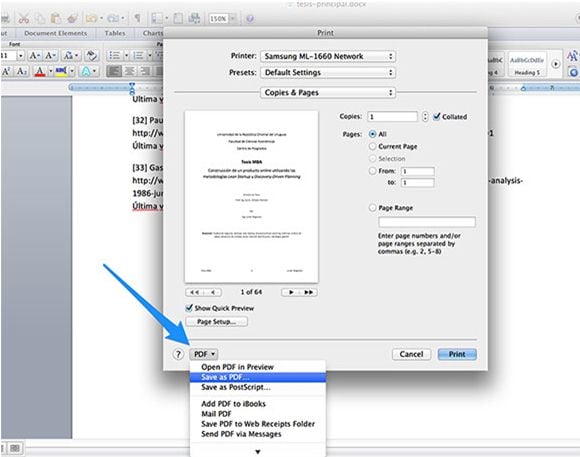2 Ways to Turn Word Into PDF on Mac
• Filed to: Mac Tutorials
Microsoft Word documents are always editable by anyone who views the document. This means that data integrity can be a concern. It’s often recommended to turn Word into PDF if you would like to secure your files. In this article, we share the best programs - PDFelement Pro that can help you turn Word to PDF on Mac while keeping the quality and layout of the source file, including the embedded links.
PDFelement Pro - The Best Way to Turn Word Into PDF
To convert Word to PDF, i highly recommend you to use PDFelement Pro. This PDF creator makes the PDF conversion very easy to accomplish. Beyond just to convert Microsoft Word documents to PDF format, you can convert PDF to Wort, PPT, Images and other file formats too.
Key Features of PDFelement Pro:
- The program comes with a super fast conversion speed even for multiple and large files.
- Output PDF files preserve the source document layout and formatting.
- It is a standalone software, and there is no need of pre-installing Microsoft Office applications to create PDF.
- The output PDF files can work with any PDF Editor, PDF Converter, PDF Reader and other PDF applications.
- PDFelement Pro features a user-friendly interface which makes it easy to use.

Part 1. Turn Word Into PDF on Mac with PDF Creator for Mac
PDF Creator for Mac is programmed to turn Word, PowerPoint and Excel files to PDF in high quality. The amazing software keeps your files safe and private, enabling you to take and transfer them with ease. It supports all the Microsoft Office file formats, including DOC, DOCX, XLS, XLSX, PPT, and PPTX. As a user, you"ll be able to create multiple PDF files in batch since the software supports multiple creations of PDF files and there is no limitation on the size or number of Word, PowerPoint or Excel files to be converted to PDF.
Steps to Turn Word to PDF on Mac
Step 1. Launch the Program
PDF Creator for Mac is available on the web for download. You can select either the free trial or the full version. Once the file is downloaded to your Mac, drag it to “Applications” and the software will be successfully installed on your Mac within a few seconds. Double-click on iSkysoft PDF Creator’s icon to launch the software.

Step 2. Import Word Files
Drag and drop the Word files/folder to the program's primary interface and the files will be automatically uploaded to the program. Alternatively, click on the “Add Files” or “Add Folder” button, select the files/folder that you would like to turn into PDF and then import them to the program.

Step 3. Turn File into PDF
Click the “Create” button located at the bottom right corner of iSkysoft PDF Creator’s interface and then set the folder to save the output PDF files. Click the “Save” button to turn your Word files to PDF.
Once the conversion process is finished, click the “PDF” icon, select the “Show in Folder” option and you will find the output PDF files. You can view and check these files by opening them with the “Preview” option.

Part 2. How to Turn Word Doc Into PDF with Word for Mac
Microsoft Office for Mac enables you to convert Word into PDF in a quick and straightforward way. The output PDF file preserves the outlay and formatting of the source file. Moreover, you can also protect the output PDF file if you decide to use the printing option.
Step 1: Open your Word file with Microsoft Office for Mac and then go to File> Save As.
Step 2: Name the file in the “Save As” box and then from the “Format” drop down options, select PDF.
Step 3: Click the “Save” button and your Word file will be turned into PDF in no time.

Common Issues When Turn Word into PDF with Word for Mac
1. Word to PDF Template Error "A footer of section 1 is set outside the printable area of the page. Do you want to continue?"
To solve it, enter Header/Footer edit screen by selecting the View> “Header and Footer”, and a new tab will be created on the ribbon. Select the new tab and at the end of the Footer from the bottom metric-1, set it to 2. You will then successfully turn your Word files to PDF without experiencing the error.
2. Borders Are Consistently Cut Off when Saving from Word to PDF
Go to File> Page Setup> Paper Size> Manage Custom Sizes and set the page to 210 x 297 (If you are saving A4 or any other size based on your paper). You will also be able to see the “Non-Printable Area.” Set the left, right, top and bottom to 0 and go back to “Save As.” All borders will be perfect with no cut offs.
3. Word Splitting Document Into Multiple Files When Saving as PDF
While trying to turn Word file into PDF, especially when some sections are set at different sizes, such as A4 and A3, the software may save all the sections as separate PDF files. To fix this, instead of using the A3 or A4 in printing options, just use US letter and it will result into a single PDF regardless of the total number of section breaks or page breaks you have.





Ivan Cook
chief Editor